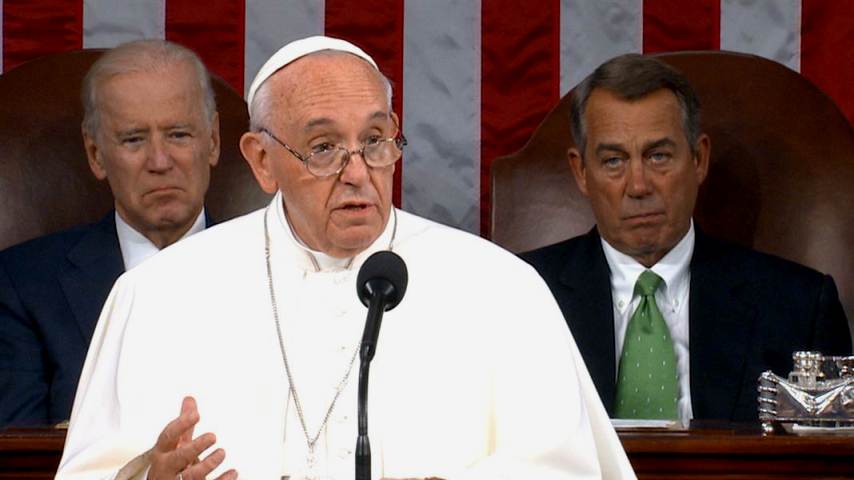To whom do you turn in the midst of crisis? Who has the requisite wisdom to lessen your doubts, your fears and anxieties?

Of all the speeches given in 2015, none comes close to that of Pope Francis, the spiritual leader of 1.2 billion Catholics. During the five days that Francis visited the United States, he was welcomed with warmth and exuberance from the thousands that attended a variety of parades and assemblies.
However, it was his address before Congress that carried particular meaning. Among lawmakers were cabinet members, three Supreme Court justices, about a half-dozen presidential candidates, a couple of four-star generals and a few bishops, priests and nuns.
In addressing issues of poverty, greed and extremism, Francis used words of compassion, hope and unity; recalling the spirit of Rev. Dr. Martin Luther King, Jr., Abraham Lincoln, Dorothy Day, who founded the Catholic Worker movement, and Thomas Merton, a Trappist monk who promoted interfaith understanding.
Listening to that speech recently, several passages stood out:
On religious freedom –
“It is important that today, as in the past, the voice of faith continue to be heard, for it is a voice of fraternity and love, which tries to bring out the best in each person and in each society. …
On extremism –
“We know that no religion is immune from forms of individual delusion or ideological extremism. This means that we must be especially attentive to every type of fundamentalism, whether religious or of any other kind. A delicate balance is required to combat violence perpetrated in the name of a religion, an ideology or an economic system, while also safeguarding religious freedom, intellectual freedom and individual freedoms. But there is another temptation which we must especially guard against: the simplistic reductionism which sees only good or evil; or, if you will, the righteous and sinners.”
On poverty –
“I would encourage you to keep in mind all those people around us who are trapped in a cycle of poverty. They too need to be given hope. The fight against poverty and hunger must be fought constantly and on many fronts, especially in its causes. I know that many Americans today, as in the past, are working to deal with this problem.”
On immigration –
“In recent centuries, millions of people came to this land to pursue their dream of building a future in freedom. We, the people of this continent, are not fearful of foreigners, because most of us were once foreigners. I say this to you as the son of immigrants, knowing that so many of you are also descended from immigrants.”
On the death penalty –
“The Golden Rule also reminds us of our responsibility to protect and defend human life at every stage of its development. This conviction has led me, from the beginning of my ministry, to advocate at different levels for the global abolition of the death penalty. I am convinced that this way is the best, since every life is sacred, every human person is endowed with an inalienable dignity, and society can only benefit from the rehabilitation of those convicted of crimes. Recently my brother bishops here in the United States renewed their call for the abolition of the death penalty. Not only do I support them, but I also offer encouragement to all those who are convinced that a just and necessary punishment must never exclude the dimension of hope and the goal of rehabilitation. …
On political leadership –
“A good political leader is one who, with the interests of all in mind, seizes the moment in a spirit of openness and pragmatism. …
“A nation can be considered great,” he concluded, “when it defends liberty as Lincoln did, when it fosters a culture which enables people to dream of full rights for all their brothers and sisters as Martin Luther King sought to do, when it strives for justice and the cause of the oppressed as Dorothy Day did by her tireless work, the fruit of a faith which becomes dialogue and sows peace in the contemplative style of Thomas Merton.”
Appearing on the House Speaker’s balcony after his address, Francis humbly asked the crowd: “I ask you all, please, to pray for me, and if there are among you any who do not believe or cannot pray, I ask you please to send good wishes my way.”
I not only pray for Francis, but for all of us to embrace a greater understanding of our neighbors, compassion for those in need, and a national unity that expresses the interests of all with “openness, pragmatism” and respect.
Comments










